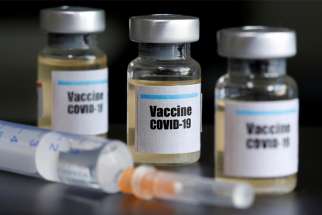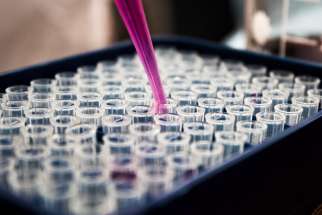VATICAN CITY -- Spanish Cardinal Antonio Canizares Llovera of Valencia made headlines when he described as a "work of the devil" attempts to find a COVID-19 vaccine using cell lines created from fetuses aborted voluntarily decades ago.
WASHINGTON D.C. (CNA) - The Japanese government is expected to approve funding for a research project, led by stem cell scientist Hiromitsu Nakauchi, to use stem cells to create animal embryos that contain human cells.
Catholic leaders: Nobel Prize for medicine a triumph for ethics
MANCHESTER, England - Catholic leaders in Europe hailed the decision to give a Nobel Prize to two pioneers of adult stem-cell research as a triumph for ethics.
A statement from the Commission of the Bishops' Conferences of the European Community, known as COMECE, said that awarding the Nobel Prize in physiology or medicine to John B. Gurdon and Shinya Yamanaka represented an "important milestone" in recognizing the superior potential of adult stem-cell research over destructive experimentation on human embryonic stem cells.
The Anscombe Bioethics Centre, an institute serving the Catholic Church in the United Kingdom and Ireland, also described the award as an "achievement of great ethical significance."
"This technique offers hope of progress in stem-cell research without relying on the unethical destruction of human embryos," said David Jones, director of the Anscombe center in Oxford, England.
"The past attempts to clone human embryos and the bizarre experiments to create admixed human-nonhuman embryos have delivered nothing," he said.
"In contrast, the transformation of adult cells into stem cells is making great progress," he continued. "This is science at its best: both beautiful and ethical."
The Nobel committee said England's Gurdon and Yamanaka of Japan had "revolutionized" science through their work.
"These discoveries have also provided new tools for scientists around the world and led to remarkable progress in many areas of medicine," the committee said.
Both scientists were involved in research into changing mature cells into stem cells, which have the potential to become specialist organ cells and be harvested in the potential treatment of a variety of diseases.
Many hope such work may prepare the ground for therapies to repair heart tissue after heart attacks, for instance, or to reverse the progress of Alzheimer's and Parkinson's diseases.
Gurdon distinguished himself by using an intestinal sample to clone frogs, and Yamanaka pioneered a technique of reprogramming mature cells to become "pluripotent" by altering their DNA.
In an Oct. 8 statement, COMECE said the award should encourage European Union institutions to switch funding from "ethically problematic and scientifically and economically less-promising" embryonic stem-cell research to non-embryonic stem cell research, which held out greater potential.
"This is an important milestone in recognizing the key role that non-embryonic stem cells play in the development of new medical therapies as alternatives to human embryonic stem cells," the statement said.
"There have been continuing scientific advances in fields of research involving alternative stem cells ... (that) present better prospects for clinical applications; or have indeed already demonstrated widespread clinical results and do not raise any special ethical problems," it said.
"Today's Nobel Prize rewards such efforts to discover alternatives," the statement added.
NASHVILLE, Tenn. - The ethics of embryonic stem-cell research can't be discussed in isolation, said Maureen Condic, a neurobiology researcher at the University of Utah School of Medicine and a senior fellow at the Westchester Institute for Ethics and the Human Person.
The discussion touches on the value of human life and intersects with the issue of abortion, said Condic, who visited Nashville to speak on the ethics of embryonic stem-cell research at the Cathedral of the Incarnation and to law students at Vanderbilt University.





